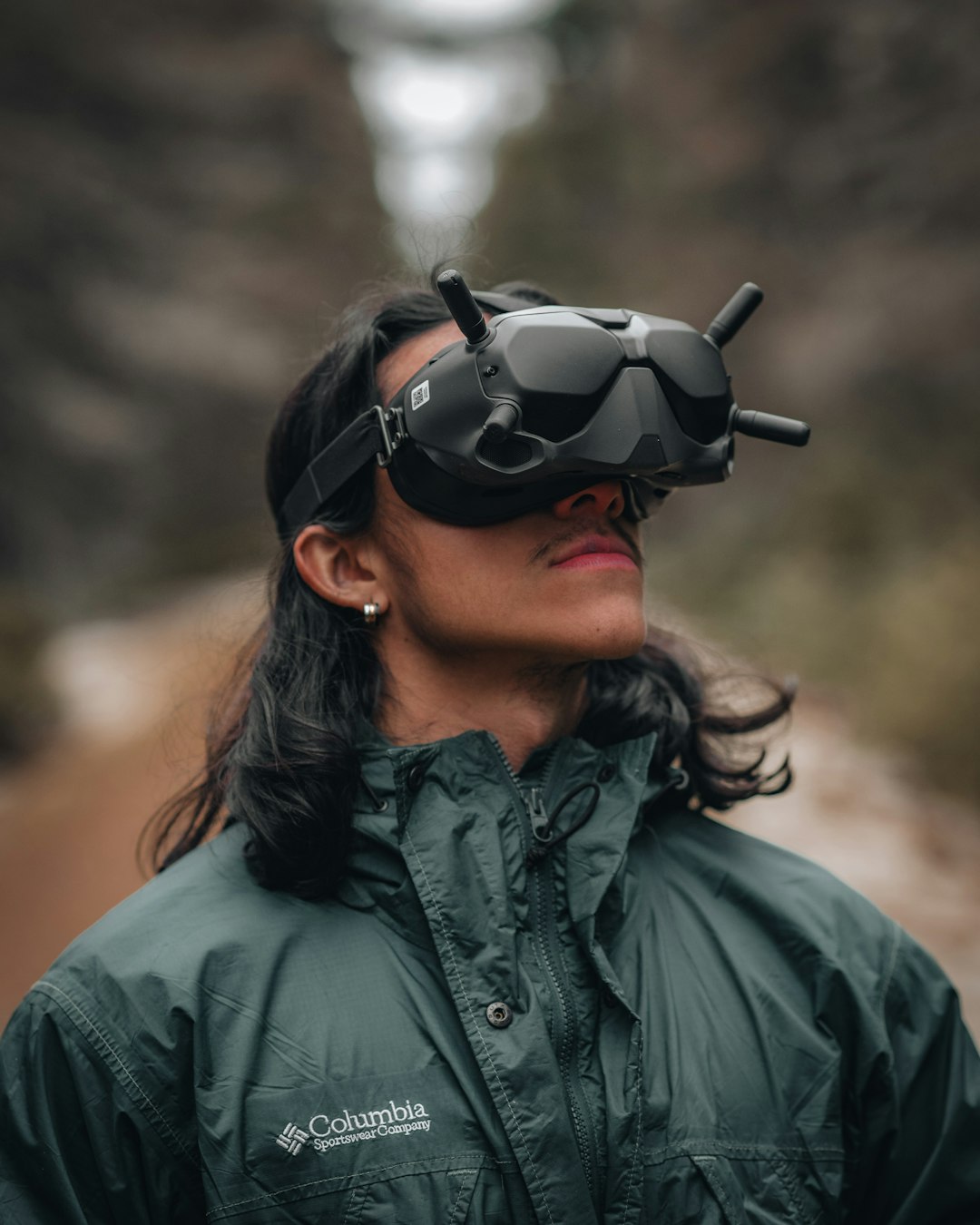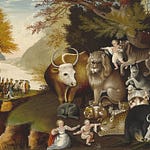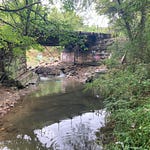I walk on a trail in the early spring, leaves bright—a yellow green, not fully operational, not yet manufacturing the chlorophyll that will be the plant’s food, not yet mining the sun for its energy. Operational, manufacturing, mining—no—breathing, eating, growing. There is a change creeping into my language, a forming—conscious and unconscious—into the patterns of the Machine. It is happening around me too. My children ask me to “pause” the reading of a book. It’s not a wrong word, it works and could have worked a hundred years ago, but its not what I would have said as a child. It is a word they’ve learned in the context of a computer—“will you pause Bluey so I can get a snack?”
The path is still muddy, here and there, water is settled on the clay from a rain the day before. White-throated Sparrows let out their szzzz call as they dart across the path, robins signal a warning of my presence with a twitch of their wings. There are titmice and chickadees, Golden and Ruby-crowned Kinglets, the metalic sound of a cowbird.
I do not have my binoculars with me. I leave my phone in my pocket instead of keeping an electronic list of the birds I encounter. I am simply walking, looking and listening. I am paying attention.
There’s a kind of self-forgetting that comes with this kind of walking. It can happen in a city, but it is easier, more consistent, when I am in wild, undomesticated places. It is like reading with the lights turned up—every word more legible. I hear and am aware, my body seems to belong, but as soon as I begin to think about it, as soon as I begin the work of cataloging or identifying—it goes away.
There is a mode of intentionality that Martin Heidegger called “attunement.” It is precognitive, pre-theoretical. The world in such a mode is not made up of discrete species, there is nothing there that could be categorized and put down on a list—warbler, sparrow; oak, elm. Instead, in “attunement” the world is encountered and constituted as “something I am involved with.”[1] As James K.A. Smith puts it: “humans construe the world—and thus orient their actions and pursuits—primordially on the basis of an affective relation to what matters.” When we begin the work of theorizing, scientifically breaking down the world into its parts, then I experience what Heidegger called a “dimming down” of reality. My attunement becomes diminished, my experience mediated.
Earlier in the week, I’d taken a walk with our dog—a brindle mut, a terrier and lab and hound and who knows what else. She is young, the world still fresh with scent, her head bobbing down along the sidewalk, her ears twitching at the sound of engines and the bark of dogs behind wooden fences. As I walked, I listened to an interview with Mark Zuckerberg, the founder and CEO of the company formerly known as Facebook and is now Meta. He was talking about the coming “Metaverse”—a virtual reality landscape that in Zuckerberg’s vision will provide a whole new mode of human life and economy. He spoke of Augustus Ceasar and expressed a curiosity of cloaked admiration for the way Augustus had ended the wars of Rome. Virtual Reality, he said, could do that. It shouldn’t be seen as an escape from a distopia, but rather an expansion of our options—a peace building enterprise like that of Augustus through which human violence and aggression can be contained in a new economy.
I thought of Heidegger and the dimming down of our encounter with the world. For all the technical prowess and computing power we could achieve, the Metaverse will never be anything but a shadow cast upon the wall of a cave—a reduction and simplification, forgotten only because we’ve been plugged into the chains of our choosing.
Why would anyone want to be in the the Metaverse? I must admit I have no personal sense of the appeal and most science fiction has presented such worlds with dystopian for good reasons. For Zuckerberg, though, this is a future filled with freedom and possibility. As an example that such a world is not only for those escaping the “desert of the real,” as The Matrix so memorably put it, Zuckerberg talked about his own recent trip to Hawaii—a place of profound and deep beauty where he enjoys surfing and being with his family. Yet even there, he said, he spent a lot of time in Virtual Reality. And though he meant the opposite I couldn’t help but feel that his example was the most dystopian vision of all. One can understand the desire to escape a decimated landscape, but to leave behind a paradise for a facsimile? That is far more of an affront to the gift of our lives in the world. And it made me think, what if VR in paradise is a truer picture of our condition than a diminished landscape? What if paradise is not lost, entirely, but we have plugged ourselves in to a Virtual Reality of our own making instead.
“Every one of us is shadowed by an illusory person: a false self,” wrote Thomas Merton. “My false and private self is the one who wants to exist outside the reach of God’s will and God’s love—outside of reality and outside of life. And such a self cannot help but be an illusion.”[2] This life of the false self is a virtual life—a non-existent reality, outside of the created order, and yet like sin itself, a parasite on what is real and true and good. In words written at a time when computers were the size of rooms, Merton’s insight is prophetic. He goes on: “All sin starts from the assumption that my false self, the self that exists only in my own egocentric desires, is the fundamental reality of life to which everything else in the universe is ordered. Thus I use up my life in the desire for pleasures and the thirst for experiences, for power, honor, knowledge and love, to clothe this false self and construct its nothingness into something objectively real.”[3] Experiences, power, honor, knowledge and love—welcome to the Metaverse, where anything you can imagine can happen.
Anything, but what is real. Anything, but the love in which we find God and find ourselves. That reality comes only from obedience, an attentive watching and waiting for God by which we find our giveness, our reality as creatures formed from the real stuff of earth. It is there that we find true liberty, for as Merton goes on to say, “In humility is the greatest freedom.”[4]
This question of what makes us free has been a central one for human life. It is a question affirmed and answered in the biblical narrative and Christian tradition—God is the God who liberates us and brings us from bondage, whose truth will set us free. The concept of freedom, though, was different in the ancient world from our own. As the political theorist Patrick Deneen explains, in the ancient and early Christian concepts, “Liberty…was not doing as one wished, but was choosing the right and virtuous course. To be free, above all, was to be free from enslavement to one’s own basest desires, which could never be fulfilled, and the pursuit of which could only foster ceaseless craving and discontent. Liberty was thus the condition achieved by self-rule over one’s own appetites and over the longing for political dominion.”[5]
Such freedom, though, works only within a particular context—the relational reality of God and creation, or at least some sense of the “gods” and an order of reality to which we are bound. This order can of course be manipulated, as it was in the ancient world where women and slaves were seen as inferior by nature, but the Enlightenment project that initiated an overthrow of that order did not provide a means of our deeper freedom, a path toward finding the true self of our given lives. When we leave the relational reality in which we are called to a particular fullness as creatures, made with value and intention, then freedom becomes something of our own making, a half truth in which our bonds are loosened but our lives are never given the gifts to flourish.
In one of his “pensees,” Pascal writes that “Since [man’s] true nature has been lost, anything can become his nature: similarly, true good being lost, anything can become his true good.”[6] This names our condition, the loss of our creatureliness reaching back to the adam, that archetypal first human formed from the earth, but it is a truth accelerated by the Enlightenment project and its technological enablers. As Deneen writes, “Our ‘culture of technology’ was premised, from the very start, on a false definition of liberty, and it now seems to be leading us ineluctably into a condition of bondage to the consequences of our own fantasy.”[7]
We long to live into fullness and flourishing, but our way is blocked by our fantasies. We keep seeking transcendence through power and technique instead of traveling the lowly road of humility by which we shed our delusions and find again the ground of our humanity. It is by Obedience to the One who humbled himself that we will find our truth.
This is a reality that St. Paul addressed in one of the most important passages in his letters, Romans chapter 5. There Paul is working to name our situation and what Christ did to change it. He names Christ as the new adam—the new ancestor and model for what human life might be. “Many people were made righteous through the obedience of one person,” writes Paul to the church in Rome, “just as many people were made sinners through the disobedience of one person” (Rom. 5:19, CEB). The Greek word used for obedience here is also the term for attentiveness, listening. The obedience that means our salvation and liberation, is one that is based not in blind submission but in attentive listening to the Word that is our source.
Merton, reflecting on the obedience of a tree, wrote that “a tree imitates God by being a tree…The more a tree is like itself, the more it is like Him.” It is not in ourselves that we find ourselves, but rather it is through obedient attention, beginning with the world of creation and moving to Word beneath it all.
Wendell Berry voices this path in his poem, Amish Economy:
And my friend David Kline told me,
“It falls strangely on Amish ears, This talk of how you find yourself. We Amish, after all, don’t try To find ourselves. We try to lose Ourselves” – and thus are lost within The found world of sunlight and rain Where fields are green and then are ripe, And the people eat together by The charity of God, who is kind Even to those who give no thanks.
This loss of self that David Kline names as the work of Amish life is, as Berry puts it, a joining in the “found world.” It is an attending in which our discovery becomes not a thing we do by ourselves but rather that we accept through an encounter with the one who discovers us. To be obedient is to live attentively before the Christ who sees us and knows us. That is where we will find our true self and the freedom that comes in our flourishing. So take off the headset, go to the found world of sunlight and rain, woods and warblers, and listen for the Word beneath it all. It is calling you.
[1] Smith, The Nicene Option, 45
[2] Merton, New Seeds of Contemplation, 34
[3] New Seeds, 35-35
[4] New Seeds, 57
[5] Deneen, The Failure of Liberalism, 100
[6] Pascal, Pensees, Penguin Classics edition 1995, 118
[7] Deneen, 109














Share this post